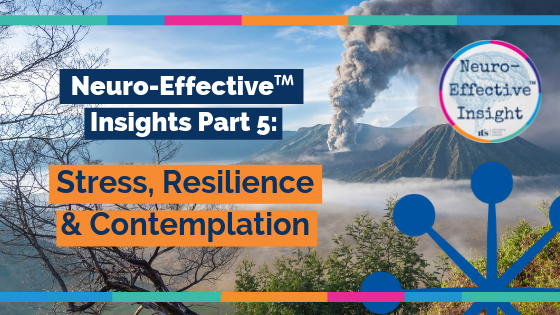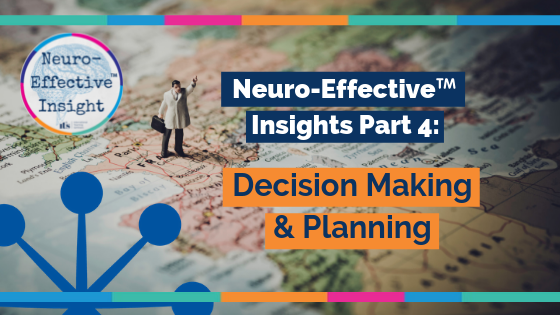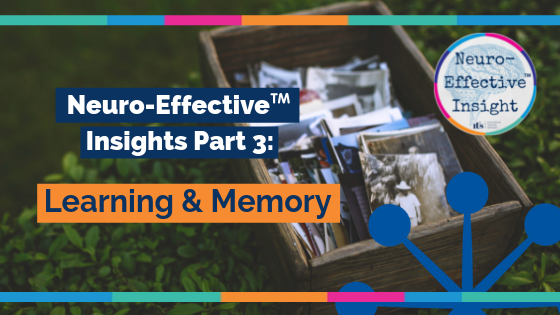Suppose I was to offer you more choices in the ways in the ways you can approach a particularly awkward work or social challenge. By doing so you could generate less conflict, more success and you might even be able to influence other people more effectively.
On top of that suppose I was to ask, would you like more insight into what’s going on in the minds of others and how this can actually affect their behaviour? Alternatively would you want a deeper understanding of how you and other people act in particular ways when you’re under stress?
Would you like some tools to help you engage in better decision making?
If the answer was yes to any of these then I think you are going to be interested in what’s going on in the world of Applied Neuroscience.
There is an amazing amount of research that has now come out which we can apply if we start thinking practically because so much of what we do is influenced by how our brain works. Given that your brain is the driving force behind every single thought, memory, emotion and behaviour that you’ve had or ever will have it’s not surprising that it would be a smart move to have a basic understanding of how you can work with your brain and make sure you’re not working against it.
This was the background to how Professor Patricia Riddell and I came to start thinking about how we could put this together in a practical usable fashion. When you start thinking about what the key areas are it would be useful for almost everybody to have a grasp of the answers.
One of these has to be your brain and your emotions – Having some understanding of the link between our emotions and what motivates us and how to use this more effectively both for ourselves and with other people. Whether it’s personal or professional, an individual or a team it’s going to make a huge difference if we understand how to have an impact at the level of what impacts the way your brain works and the way other people’s brains work.
For instance have you ever had the question of do you stick with what you have or do you think it’s time to move on? Well how do you decide?
That’s the kind of question that work coming out from Applied Neuroscience is really useful in helping us be better able to address. Similarly not only what motivates you but what de-motivates you tells us a lot about what’s going on in your brain. It’s useful to know what is going on in your brain as this will help us understand how this impacts other people’s brains especially if you’re working with them.
But suppose also you could learn how to discriminate a wider range of emotional responses and expressions. A lot of people don’t even pick up on the cues that are there in front of them or that they are experiencing internally because they just don’t make adequate distinctions. Now we have a way of doing this courtesy of neuroscience which is really on the cutting edge and extremely useful. In the same way if you could become more flexible in the way that you emotionally respond and you don’t use the same few responses you will almost certainly be able to have more choice in your life, not just for you but for your children if you are a parent. This seemed like quite an obvious area and is why we turned this into a workshop, two days’ worth.
A second area that seems really significant to us is being able to use your brain to be to promote learning and memory. Most people are not aware that there are different types of memory and until you understand that you don’t know which to use when. Not only are there different types of memory of course there are different types of learning. Understanding how to use both of those has an enormous impact on your ability to maximise potential either of yourself or other people because you are going to be able to learn quickly and to maintain the learning if you work with your brain.
Learning how to stop forgetting things, would that be useful? For most people it seems the answer is yes. Not only not forgetting but learning how to create lifelong learning for other people is just as significant and all comes down to understanding how your brain works.
You don’t have to be a neuroscientist, there are some basic elements here which as I’m not a neuroscientist I can tell you have been extremely useful finding out about. Being able to apply these tools in the real world seems to me to be of great value as is, of course if you have kids, knowing how to help them.
So guess what – there’s another area and that’s another workshop.
In the same way, we started thinking about how you would want to use your brain to promote creativity and insight because that’s critical to successful innovation in anybody’s life – be it in a working life or just in the way they live.
That really gave rise to a third workshop which was something we wanted to put together to focus on how everybody has moments of insight where they have an idea or a solution comes to them out of the blue as it seems. But the real question is what is it that happens in your brain during those moments? How could you create that type of original thinking when you need it most? Could you do that at will?
Well actually the answer is yes if you understand what’s going on. What state does your brain need to be in to give you the best chance of achieving that? There are answers and it’s ridiculous that these aren’t more widely known. This of course becomes part of our third workshop.
Ideally what we want to give people is the chance to learn about the different kinds of creativity so that you know what sort you need and in which context. When you learn about the different kinds of creativity you also get very clear about your particular strengths and how to play to those. Very often people don’t know that and of course it’s very confidence building when you do. Learning how to promote creativity in yourself is actually something which also makes it possible to promote in other people. Talking about your confidence growing and other people’s confidence will begin to grow as they begin to find that they can perform more effectively. This has got huge implications if you are ever in a leadership role.
Again a key area when we were talking about what could make the maximum impact in terms of improving people’s lives was how neuroscience help and improve people’s decision making and their planning abilities because these are fundamental to having an effectively life essentially. First of all you need to determine what the different ways of making decisions are. There are three primary decision making functions in your brain and each of them is evolved to do something different for you so it would be useful if you knew which system works best for which kind of issues.
Also each of them potentially can trip you up if you use them when it’s not the most appropriate style so there’s some understanding here about how you function which isn’t hard to learn.
Being able then to identify, strengths and weaknesses in yourself, and of course potentially in others as well is incredibly useful. If you put this into a team context it would be useful if you could identify which members of your team are best at making which type of decisions as this could also impact the kind of people you would want to recruit. You would therefore know how to recruit different types of decision makers.
Whenever we make decisions we are filtering so another aspect of this is about learning how bias and stereotypes can impact decisions. Everybody has biases and it’s ok. It doesn’t mean you are prejudice, it just means we filter for some things rather than others. Getting the tools to protect yourself against unconscious bias and poor decision making is going to have a huge impact on how effective you can be. So guess what, there’s another workshop.
Finally, when we were thinking how could we make up the ‘Greatest Hits’ of Neuroscience now and what it can bring to bear for everybody it seemed to us that it’s really important that people know how Neuroscience can help you deal with stress and build your own resilience. People have increasingly stressful lives and often don’t understand that stress in itself is neither good nor bad. There are both kinds actually and being able to distinguish between good stress and bad stress and what makes each either good or bad for particular people is something that enables us to get a much better hand on what’s going on and how we can be back in charge.
To that end we have put together the tools and the ways of understanding that will give you a diagnostic indication so you have a clearer understanding of what’s going on with yourself and indeed with others. In the same way there are a whole bunch of practical tools which can increase your resilience and help you operate better in those stressful situations.
Now for me that’s been an incredibly interesting journey, working with Professor Riddell about how do we bring these worlds together and I think these are real benefits. Certainly when we ran the programme last year we got this astonishing feedback where people were not just saying this is very interesting or this is great, there was a lot of expression of gratitude. I think people felt as though they were getting access to privileged information which is not easily available and in a way I think it’s true.
This has been a very rewarding journey and I think it’s just beginning. I’m really looking forward to this, our annual event, as it now is. In only a few days’ time we will be starting the journey of the Certificate of Applied Neuroscience because everything I’ve just described is what we want to cover during the modules of the programme.
If that’s of interest to you who knows we may be in the same room at the same time very shortly, but either way I hope this gives you a little taste of where I think the world is going and where scientific research can offer practical possibilities when it is put into this practical context. As you know my particular inclination is that with the practical applications of what’s being found out so if you’re interested in applying this in your own life I guess we might be meeting up – Either way I will be having a very good time.
‘Till the next time.




Leave A Comment